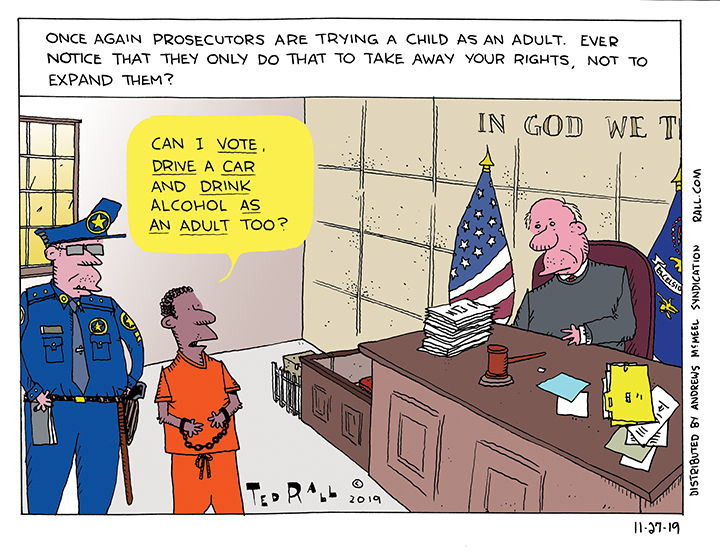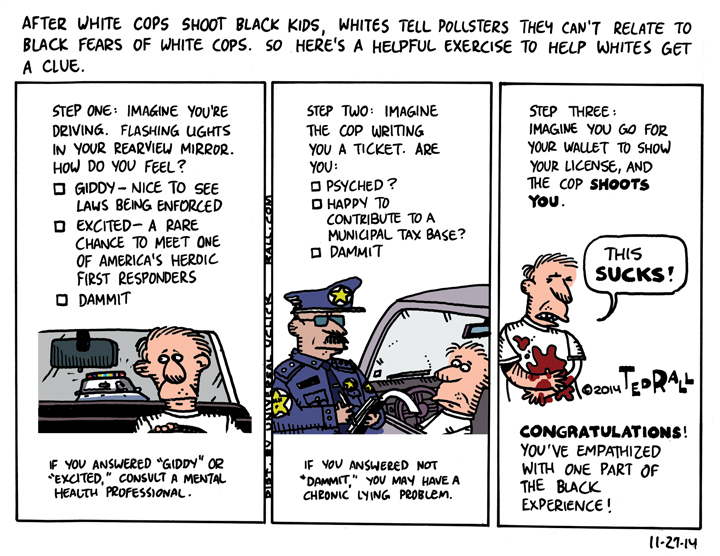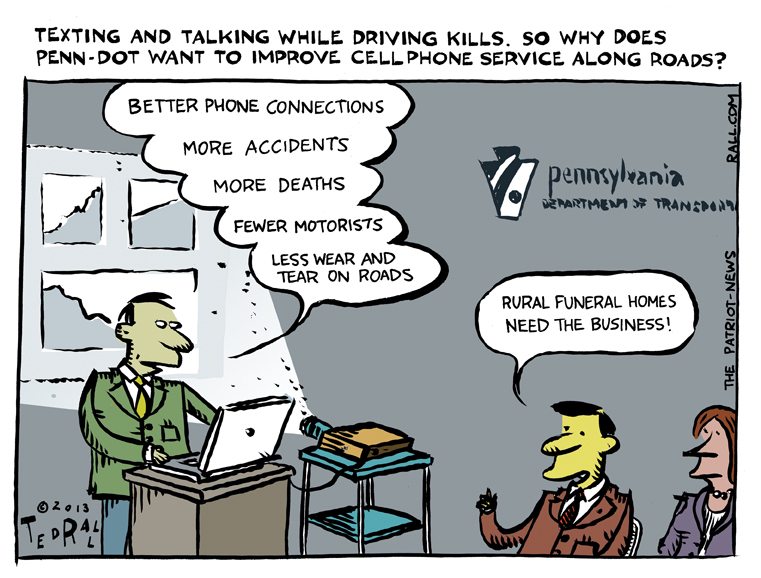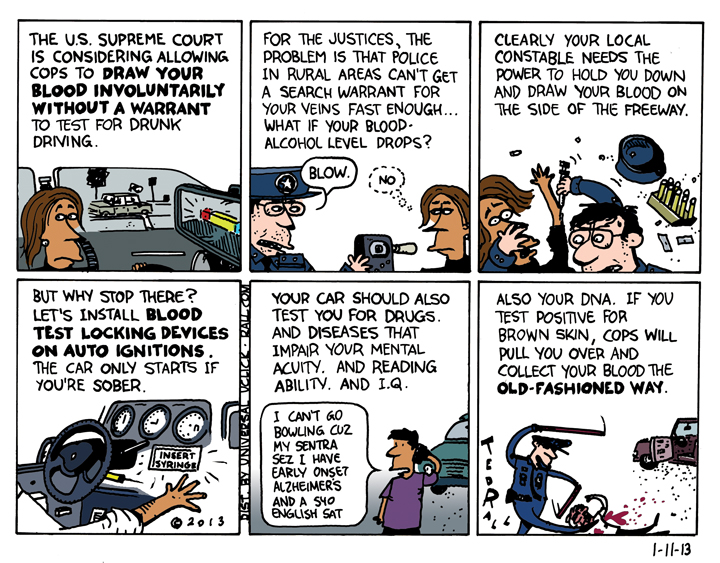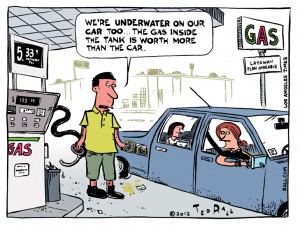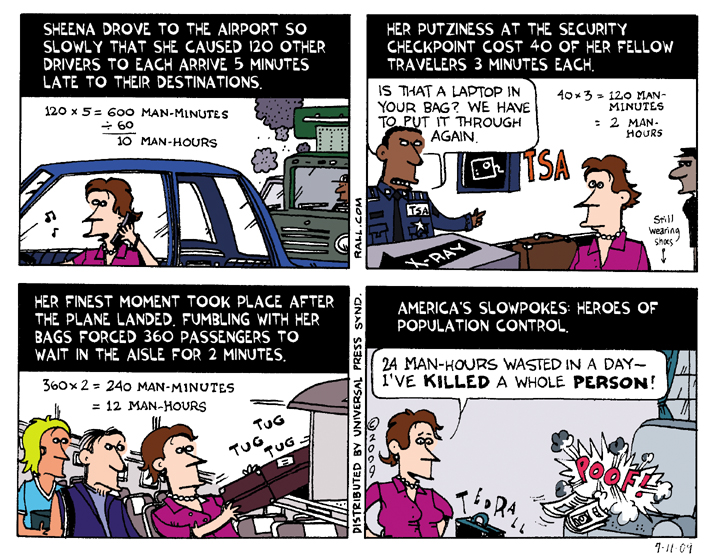Prosecutors like to try children as adults. But they never offer children the privileges of adults.
SYNDICATED COLUMN: Hillary Clinton Runs First, Thinks Last

The revealing headline: “Hillary Clinton Will Run; She Still Has to Explain Why.”
The money quote from the story beneath that headline: “For months, Mrs. Clinton has lamented the stagnant wages holding back lower-income people and the concentration of wealth among a sliver of the wealthiest, a sentiment echoed in her first public remarks as a 2016 candidate.”
Linger on that sentence’s introductory phrase: “For months.”
Months?
!
What?
Hillary has been a political animal for decades. She’s been a possible future presidential candidate since at least 1996 — the year she last drove a car. She’s just getting around to figuring out what her politics are?
(By the way and speaking of which, someone in Hillaryworld needs to clue in She-Who-Must-Be-Driven to basic automotive vernacular. When one is a passenger, one does not say, as Secretary Clinton did yesterday, “when I was driving here.” Driving is something one does, not something that is done to you. Unless you are actually, you know, driving, the correct phrase would be: “when I was riding here.” Unless, of course, this is one of those misremembering “dodging sniper fire” senior moments.)
Maybe I took high school civics class too seriously, but I thought the correct order was:
First, come up with list of ideas, policies, and bills that you would, as President of the United States, promote, enact and propose.
Second, run for President of the United States.
This, however, is no longer how a professional political class so removed from the lives of the average citizen that they not only don’t drive but don’t even know words about driving — who think being worth $25 million equals “dead broke,” and that earning $12 million a year makes you “not truly well off” — sees it. First, they fundraise. Second, they run. Third, they figure out what they believe in.
With a campaign warchest likely to set new records, the task of selling influence in a 2017-2021 first term is well underway. Unless she dies or gets hosed by a new scandal, Hillary has the Democratic nomination all sewn up. Which means it’s time for the last priority: ginning up a platform.
At this writing, Clinton says she wants to be a “champion” for “everyday Americans.” What does that phrase even mean? As opposed to what — Americans who live outside the standard Sunday-to-Saturday space-time continuum? Is there some special eighth-and-a-halfth day for one percenters?
There are, she told Iowans, “four big fights that I think we have to take on.”
Hillary’s big fight #1: “We need to build the economy of tomorrow, not yesterday.” Question: will there be flying robots? If there are flying robots, I’m in! But not flying robot murderers, like we use to kill Pakistanis and Yemenis. Too much tomorrow.
Big fight #2: Strengthening families. “When families are strong, America is strong.” You’ve been warned, single people who drain America’s strength — Hillary is coming for you! “Because it’s your time. And I hope you’ll join me on this journey.” Hell-o, Oprah!
Big fight #3: Campaign finance reform. “We need to fix our dysfunctional political system and get unaccountable money out of it once and for all – even if that takes a constitutional amendment.”
Big fight #4: National security. “We need to protect our country from the threats that we see, and the ones that are on the horizon.”
With all due respect — in other words, none — Hillary’s “platform” reads like a mash-up of Dick Morris’ focus-grouped pabulum and a schoolchild answering test questions about a book she didn’t read.
The “big fight” thesis gets an F: Who’s against “an economy of tomorrow”? Does anyone oppose stronger families? If a presidential candidate has ever run in favor of letting threats go unanswered, it’s news to me.
Of Hillary’s “big four fights,” only a constitutional amendment to reverse the Citizens United decision has substance. But campaign finance reform is a low priority for Americans. What Americans care most about, polls have shown consistently, is the economy. People want more jobs, higher wages, better job security.
In all fairness, Hillary isn’t the only run-first-think-second presidential contender. With the exception of Rand Paul, there isn’t much beef on the Republican side either.
Still, Hillary’s lameness towers above the rest if for no other reason than the fact that she’s had at least 20 years to think about what she’d do as president. If this is all she can think up after all this time, how slowly will she react when she gets that hotline phone call at 3 a.m.?
(Ted Rall, syndicated writer and the cartoonist for The Los Angeles Times, is the author of the new critically-acclaimed book “After We Kill You, We Will Welcome You Back As Honored Guests: Unembedded in Afghanistan.” Subscribe to Ted Rall at Beacon.)
COPYRIGHT 2015 TED RALL, DISTRIBUTED BY CREATORS.COM
The Government’s Drive to Criminalize Driving While Talking
Welcome to the dawning of the age of DWT — the criminalization of “driving while talking.”
For the first time, the National Transportation Safety Board (NTSB) has issued a formal recommendation calling for states to prohibit the use of cellular phones while driving.
Yes, that’s right. The board even wants to ban mobile phone use while using hands-free devices like earbuds and those fancy cars that let you pick up the phone through the dash using Bluetooth, which are currently viewed as less likely to distract drivers.

The NTSB doesn’t have legal authority to enforce its proposed phone-use ban, but its recommendations are taken seriously by state regulators and legislators.
“There is a large body of evidence showing that talking on a phone, whether hand-held or hands-free, impairs driving and increases your risk of having a crash,” Anne McCartt, SVP for research at the Insurance Institute for Highway Safety, told The Huffington Post.
Automobile safety experts agree that distracted driving is behind a growing portion of the accident rate, which in general is falling.
Marcel Just of Carnegie Mellon University’s Center for Cognitive Brain Imaging, co-authored a test of “the performance of drivers not engaged in conversation and drivers who could hear someone talking to them through headphones. Drivers took the simulator tests inside an MRI (magnetic resonance imaging) machine that recorded images of changes in their brains while driving, including which areas of the brain were used for driving. The amount of the brain devoted to driving was 37 percent less in drivers who could hear someone talking to them than for drivers not using cellphones.”
“The human mind can multitask, but each task is performed with less brain power and lower proficiency,” Just explained.
The NTSB says 18 percent of automobile fatalities are caused by distracted driving (including causes other than phones).
Other distractions, such as children and other passengers in the vehicle, are viewed to be relatively neutral from a traffic safety standpoint. You might be distracted by your screaming kids, but one of them might also point out the potential danger that you might otherwise have missed.
Forty percent of Americans told the National Highway Administration they don’t think that hands-free driving is dangerous. But if you’re like me, and you’re honest with yourself, you have to know that you have more close calls when you text or talk on the phone as you drive.
Still, it’s hard to know where to come down on this question of freedom versus safety. Horror novelist Stephen King was nearly killed by a guy distracted by his dog, but it sure would be sad to mandate that dogs be locked in their cages throughout a drive.
What’s certain is that, if a ban on driving while talking becomes law, it will have significant cultural and economic implications.
A Return to Disconnection
In their early days, cellular phones were more of a way for you to call someone else than for you to be reachable. There were many places where they simply didn’t work: inside buildings, out in the sticks, even in the middle of some cities.
Starting in the 1990s for most Americans, the digital revolution has seen connectivity increased to the point that it is easy to foresee a time when everyone would become available to everyone all the time. Cellular signals have spread into remote rural areas, including national parks, and even into subways. The FAA is currently considering a proposal to allow the use of cellular phones on airplanes.
One place where cellular phones have been popular has been behind the wheel of an automobile. Getting stuck in traffic isn’t as bad if you know you can make a few important calls while you’re sitting there sucking up the exhaust fumes. (Since everyone else is doing the same thing, of course, their reaction times aren’t as great, which means that traffic jams are bigger and longer, but whatever.)
There’s just no denying the appeal of using time that used to be close to a total waste — transportation from point A to point B — to make a call. Not to mention the ability to check Google Maps for a quicker route around that jam, and to text your friend to tell him that you’re running late.
If the NTSB gets its way, all that will be over. Cops will have devices that allow them to track the use of cell phones from moving cars, and though some people will break the law, for most the only interaction you’ll have is with your radio or fellow passengers — if, of course, it’s enforced.
It’s obviously impossible to quantify the cost to business, but I have to think it would be high.
On the other hand, the glory days of unavailability would return. Don’t feel like picking up a call? You can always tell your boss you were stuck in traffic. It would have been illegal for you to talk to them.
Mothers Against Talk Driving?
Talkers won’t be demonized as badly as drinkers, but the media and politicians will declare those who break laws against using cell phones while driving to be irresponsible buttholes, who don’t care if they kill your kid so they can pick up a pizza without waiting for it to be made. There will be ad campaigns, sad-eyed dead children and of course high fines, prison sentences and asset forfeiture.
Trains and Planes Instead?
Some people may decide to switch to alternative forms of transportation where they are still allowed to use their phones in transit. For many people, especially those conducting business during daytime hours, the desire for conductivity will trump all other considerations.
Which might be good — that means less traffic on the roads.
Reverse Darwinism
Experts say that we should expect fewer accidents as a result of a cell ban, which would obviously be great, but what about culling the herd? What if we end up with more, stupider people?
Just kidding.
Is Driving Doomed?
Originally published at Breaking Modern:
Is driving doomed? Fewer young people are buying cars or getting drivers licenses ….

HARRISBURG PATRIOT-NEWS CARTOON: PennDOT’s Cellphone Addiction
It’s been well established that cellphone use – texting and talking – don’t mix well with driving. So why is Pennsylvania’s Department of Transportation (PennDOT) pushing to improve cellphone service along state roads? That’s the subject of my cartoon for the Harrisburg Patriot-News, for which I draw cartoons about state and local politics.
Vein Rape
The US Supreme Court is currently considering allowing police to draw your blood involuntarily without a warrant in the event that you refuse a breathalyzer test if you are suspected of drunk driving. It is an incredibly invasive procedure, but the authorities and the courts are siding with the cops because, incredibly, they complained that sometimes it is too difficult to get search warrants for your veins and arteries quickly enough before your blood alcohol level dissipates to legal levels.
LOS ANGELES TIMES CARTOON: Underwater on the Car
I draw cartoons for The Los Angeles Times about issues related to California and the Southland (metro Los Angeles).
This week: Gas prices in California are at a record high for the third day in a row, up slightly more than a cent overnight at $4.668 for a gallon of regular just as motorists start their work week. The cost of fueling up has soared in recent days, as refinery and pipeline problems squeezed supply. The steep and sudden run-up caused Gov. Jerry Brown to call Sunday for a quick infusion of winter-blend gasoline.

